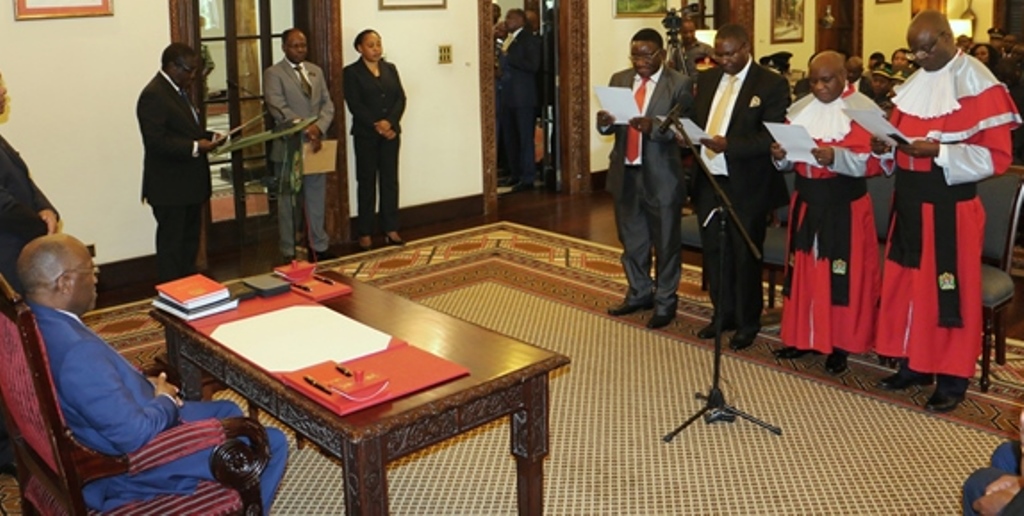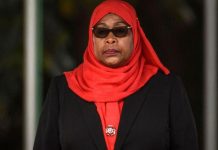AfricaPress-Tanzania: IMMEDIATELY after he took oath of office on November 5, 2015, President John Magufuli appointed Judge George Masaju as the new Attorney General (AG) of the United Republic of Tanzania.
Judge Masaju, who also served in the fourth phase government under retired President Jakaya Kikwete was by then appointed to replace former AG, Judge Frederic Werema, who retired in December 2014 over the Tegeta escrow scandal.
Appointment of the AG is done in fulfillment of Article 59 of the Constitution of the United Republic of Tanzania that among other things, tasks the person to be an adviser of the government on matters of law.
Also, Article 59 (5) provides that by the virtue of the office, AG is a Member of Parliament and also an ex officio member of the Cabinet.
The 11th Parliament that has drawn to an end has been served by two AGs, where the first one was Justice Masaju who started in November 2015 and ended in January 30 2018, and followed by the current one, Prof Adelardus Kilangi, who ascended to the office on February 1st, 2018 after Mr Masaju was appointed a Judge of the High Court.
During his tenure as the AG, between November 6 2015 and January 31 2018, Justice Masaju engineered establishments of 21 Bills and Amendments of more than eight laws.
List of Bills that were tabled included- The Access to Information Bill, 2016,The Appropriation Bill, 2016,The Chemist Professionals Bill, 2016,The Copyright and Neighbouring Rights (Copyrighted Works- Communication to the Public) Regulations), Bill 2016, and The Finance Bill, 2016.
Others are the Government Chemist Laboratory Authority Bill, 2016, The Institute of Judicial Administration Lushoto (Students’ Performance Assessment) Regulations, 2016, The Legal Aid Bill, 2016, and The Media Services Bill, 2016.
The list also cited the Medical, Dental and Allied Health Professionals Bill, 2016, the Public Procurement (Amendment) Act 2016, the Tanzania Agricultural Research Institute Bill, 2016, the Tanzania Fisheries Research Institute Bill, 2016 as well as the Valuation and Valuers Registration Bill, 2016.
Moreover, he tabled the Drugs Control and Enforcement Amendment Bill, 2017, the Wildlife Conservation (Amendment) Bill, 2017, the Finance Bill, 2017, the National Shipping Agencies Bill, 2017, the Railways Bill, 2017, and the Tanzania Telecommunications Corporation Bill, 2017.
He also tabled the Natural Wealth and Resources (Permanent Sovereignty) Bill 2017, the Natural Wealth and Resources Contracts (Review and Re- Negotiation of Unconscionable Terms) Bill, 2017, as well as the Public Service Security Fund, Bill, 2017.
It was during his tenure when the mining laws were reviewed and signed by President Magufuli.
The Acts require the government to own at least a 16 per cent share in the newly established mining firm, Twiga Mineral Corporation with the remaining 84 per cent shares being owned by Barrick gold mines.
This has assured the government of full supervision and participation in making decisions at the North Mara, Bulyanhulu and Buzwagi Mines as well as increasing royalty tax on gold and other minerals.
Justice Masaju also tabled amendments in various laws approved by the Parliament during his tenure, which include the Written Laws (Miscellaneous Amendment) bill 2016, the Written Laws (Miscellaneous Amendments) (No. 3) Bill, 2016 and the Written Laws Miscellaneous Amendments) (No.4) Bill, 2016.
Others were Written Laws (Miscellaneous Amendments) Bill, 2017, the Written Laws (Miscellaneous Amendments) (No. 3) Bill, 2017 the Written Laws (Miscellaneous Amendments) Act (No.4) 2017, as well as the Written Laws (Miscellaneous Amendments) (No. 5) Bill, 2017.
The Second Attorney General Prof Kilangi, apart from clarifying various issues to members of the parliament in the house, immediately after his appointment, several lawyers described the two appointees as excellent, efficient and capable persons to occupy the posts.
They further said that the AG is a principled and ‘no-nonsense guy,’ “This is the right choice the President has made. I know them (appointees) very well. One of them was my classmate at university level. They are both very efficient and committed. I know they will manage the positions,” Dr Onesmo Kyauke said.
Expounding further on his reactions, Dr Kyauke knows Prof Kilangi very well as specialised in oil and gas law. He said that his appointment as AG has come at the right time as the country is trying to protect its unique resources.
“…Prof Kilangi will play an important role on this matter to ensure the country benefits from this sector,” he said.
Serving as the AG, Prof Kilangi has so far tabled 13 Bills and Amendments of Eight Acts including the Land Transport Regulatory Authority Bill, 2018, the Finance Bill, 2018, and the Microfinance Bill, 2018.
Others are the Political Parties (Amendments) Bill, 2018, the Public, Private Partnership (Amendment) Bill, 2018, the Teacher’s Professional Board Bill, 2018, the Tanzania Meteorological Authority Bill, 2018 as well as the Water Supply and Sanitation Bill, 2018.
The list also cited the e-Government Bill, 2019, The Finance Act, 2019, and Finance Bill, 2020, Public Health Bill, 2020 as well as the Deep Sea Fisheries Management and Development Bill, 2020.
Others tabled were The Written Laws (Miscellaneous Amendments) (No 2) Bill, 2018, The Written Laws (Miscellaneous Amendments) (No.3), Bill 2018, The Written Laws (Miscellaneous Amendments (No. 4) Bill, 2018 and the Written Laws (Miscellaneous Amendments) (No. 2) Bill, 2019.
Again others are the Written Laws (Miscellaneous Amendments) (No.3) Act, 2019, the Written Laws (Miscellaneous Amendments) (No.5), Bill, 2019, the Written Laws (Miscellaneous Amendments) (No.6), Bill 2019 as well as the Written Laws (Miscellaneous Amendments) (No. 8) Bill, 2019.
The most recent Bill that was tabled by Prof Kilangi is the Proposed Written Law Miscellaneous Amendment Number 3, Act 2020 that among other things give the President and other top leaders “absolute immunity” from both civil lawsuits and criminal prosecution in any court of law during their term in office.
Those in the list are the President of the United Republic, Vice-President, Prime Minister, Speaker, Deputy Speaker as well as Chief Justice.
Initially, the AG had informed the House that the new amendments are in conformity with the content of the immunity for senior government leaders against prosecution.
The proposed amendments also included amendment of the President Affairs Act, Cap 9.
The new changes propose that civil proceedings instituted pursuant to the section shall be instituted after the President ceases to hold Office of the President.







